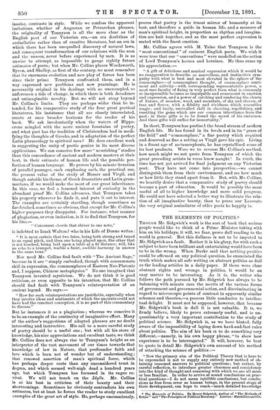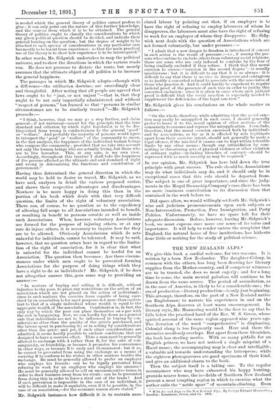THE ELEMENTS OF POLITICS.*
THOUGH Mr. Sidg wick's work is the sort of book that serious people would like to think of a Prime Minister taking with
him on his holidays, it will, we fear, prove dull reading to the world in general. But this dullness is not to be imputed to Mr. Sidgwick as a fault. Rather it is his glory, for with such a subject to have been brilliant and entertaining would have been to be in the wrong. When Burke said that nothing positive could be affirmed on any political question, he enunciated the truth which makes all safe writing on abstract politics as dull as the leading artieles in a daily paper. If there were clear abstract rights and wrongs in politics, it would be an easy matter to be interesting. As it is, the writer who follows the path pursued by Mr. Sidgwick has always to be balancing with minute care the merits of the various forms of government and governmental action, and discriminating in regard to microscopic points of contrast in apparently similar schemes and theories,—a process little conducive to intellec- tual delight. It must not be supposed, however, that because Mr. Sidgwick's book is dull it is not valuable. It is, we firmly believe, likely to prove extremely useful, and is un- questionably a very important contribution to the study of political science. Mr. Sidgwick is, as we have hinted, fully aware of the impossibility of laying down hard-and-fast rules about politics. The aim of his book is to do something very different,—namely, in his own happy phrase, "to show how experience is to be interrogated." It will, however, be best to quote in detail Mr. Sidgvvick's own account of his method of attacking the science of politics :—
"Now the primary aim of the Political Theory that is here to be expounded is not to supply any entirely new method of ob- taining reasoned answers to political questions ; but rather, by careful reflection, to introduce greater clearness and consistency into the kind of thought and reasoning with which we are all more or less familiar. In order to arrive at sound conclusions on prac- tical questions—I do not mean infallible conclusions, but conclu- sions as free from error as human beings, in the present stage of their development, can hope to reach—much detailed knowledge • Th.s Elements of Politics. By Henry Sidgwick, Author of "The Methods of Ethics" and "The Principles of Political Economy." London : Macmillan and Co.
is needed which the general theory of politics cannot profess to give : it can only point out the nature of this further knowledge, and the sources from which it is to be obtained. The general theory of politics ought to classify the considerations by which any given political question should be decided, and indicate their general bearing on the question : but the degree of weight to be attached to each species of considerations in any particular case has mostly to be learnt from experience : so that the main practical use of the theory is to show how experience is to be interrogated."
In other words, Mr. Sidgwick undertakes to map the political universe, and to show the directions in which the various roads run. He does not presume to dictate the route, but merely assumes that the ultimate object of all politics is to increase the general happiness.
The passages in which Mr. Sidgwick adopts—though with a difference—the utilitarian doctrine, are exceedingly clear and thoughtful. After noting that all people are agreed that laws ought to be "just, or not unjust "—that is, that they ought to be not only impartially administered and without "respect of persons," but framed so that "persons in similar eircumstanues are to be similarly treated "—Mr. Sidgwick proceeds :—
" I think, however, that we may go a step further, and claim general--if not universal—assent for the principle that the true standard and criterion by which right legislation is to be dis- tinguished from wrong is conduciveness to the general good or welfare.' And probably the majority of persons would agree to interpret the ' good ' or 'welfare' of the community to mean, in the last analysis, the happiness of the individual human beings who compose the community; provided that we take into account not only the human beings who are actually living, but those who are to live hereafter. This, at any rate, is my own view. Accordingly, throughout this treatise I shall take the happiness of the persons affected as the ultimate end and standard of right and wrong in determining the functions and constitution of government."
Having thus determined the general direction in which the world may be held to desire to travel, Mr. Sidgwick, as we have said, analyses in detail the various proposed routes, and shows their respective advantages and disadvantages. Nowhere is he more happy in doing this than in the portion of his book which deals with that very difficult question, the limits of the right of voluntary association. There can, of course, be no question as to the expediency of allowing fall scope to all Associations intended to benefit, or resulting in benefit to persons outside as well as inside such Associations. When, however, voluntary Associations are formed for the purpose of injuring others, or at any rate do injure others, it is necessary to inquire how far they are to be allowed. Obviously Associations which do acts unlawful for individuals, cannot be tolerated. It may be said, however, that no question arises here in regard to the limita- tion of the right of association, for it is clear that what is unlawful for the individual cannot be lawful for an Association. The question then becomes : Are there circum- stances under which men ought to be prevented forming Associations for the purpose of doing things which they have a right to do as individuals ? Mr. Sidgwick, if he does
not altogether answer this, goes some way to providing an answer :—
" In matters of buying and selling it is difficult, without injustice to the poor, to place any restrictions on the action of an association which are not placed on the action of individuals : since in such matters the coercive force capable of being exer- cised by an association is for most purposes not more than equiva- lent to that of a single individual whose wealth is equal to the aggregate wealth of the association. Combination is, in fact, the only way by which the poor can place themselves on a par with the rich in bargaining. Now, we can hardly lay down as a general rule that individuals are not to be influenced in buying by con- siderations other than the quality of the article purchased, and the labour spent in purchasing it; or in selling by considerations other than the price : and yet, if such other considerations are admitted, it seems hardly possible to exclude conditions that are designed to have a coercive effect. Thus a man must be generally allowed to exchange with A rather than B, for the sake of con- sanguinity, or friendship, or because A promotes his convenience in other ways, or because B is surly and ill-mannered: but if so, he cannot be prevented from using the exchange as a means of coercing B to conform to his wishes in other matters besides the exchange. He must be generally allowed to prefer an employer who employs his friends : can he be legally prevented from refusing to work for an employer who employs his enemies ? He must be generally allowed to sell on unremunerative terms in order to draw business away from his rivals : can he be prevented from doing this in order to force a rival out of the trade ? And if such prevention is impossible in the case of an individual, it will be difficult to make it equitable, even if it be possible, in the case of an association,—for the economic reason above stated."
Mr. Sidgwick instances how difficult it is to restrain asso-
ciated labour by pointing out that, if an employer is to have the right of refusing to employ labourers of whom he disapproves, the labourers must also have the right of refusing to work for an employer of whom they disapprove. Mr. Sidg- wick next deals with the question of Associations which are not formed voluntarily, but under pressure :--
"I admit that a now danger to freedom is introduced if concert in such action is the result of pressure :—i.e., if among the per- sons who combine to exclude others from voluntary social relations, there are some who are only induced to combine by the fear of being similarly excluded if they refuse. I think that this moral coercion to coerce= coercion in the second degree '—is usually mischievous : but it is difficult to say that it is so always : it is difficult to say that there is no vice so dangerous and contagious as to justify a concerted refusal to associate with the associates of those who practise it. And it could hardly be expedient to require judicial proof of the presence of such vice in order to justify this concerted exclusion : since it is often in cases where such judicial proof is difficult that the social sanction is especially needed to supplement the deficiencies of the legal sanction."
Mr. Sidgwick gives his conclusions on the whole matter as follows :—
" On the whole, therefore, while admitting that the social sanc- tion may easily be misapplied in such cases, I should generally prefer to leave it to the moral opinion of other sections of the community to censure and repress the misapplication. I conclude, therefore, that the moral coercion exercised both by individuals and by associations, so far as it is effected by acts legitimate apart from their coercive intent, should not generally bo made a legal offence, if the mischief it causes can be kept within tolerable limits by any other means : though any intimidation by com- mitting or threatening acts of physical violence or other violation of ordinary rights—including breaches of contract—should be repressed with as much severity as may be required."
In our opinion, Mr. Sidgwick has here laid down the true principle with great success. The rule should be, Associations may do what individuals may do, and it should only be in exceptional cases that this rule should be departed from. The subject is one of great importance, and since the judg- ments in the Mogul Steamship Company's case, there has been no more luminous contribution to its discussion than that contained in the work before us.
Did space allow, we would willingly set forth Mr. Sidg wick's wise and judicious pronouncements upon such subjects as Non-Intervention, Protection, Free Immigration, and Party Politics. Unfortunately, we have no space left for their adequate discussion. Before, however, leaving Mr. Sidgwick's book, we must express once more our sense of its value and importance. It will help to render untrue the complaint that England, the natural home of free institutions, has hitherto done little or nothing for the study of political science.











































 Previous page
Previous page